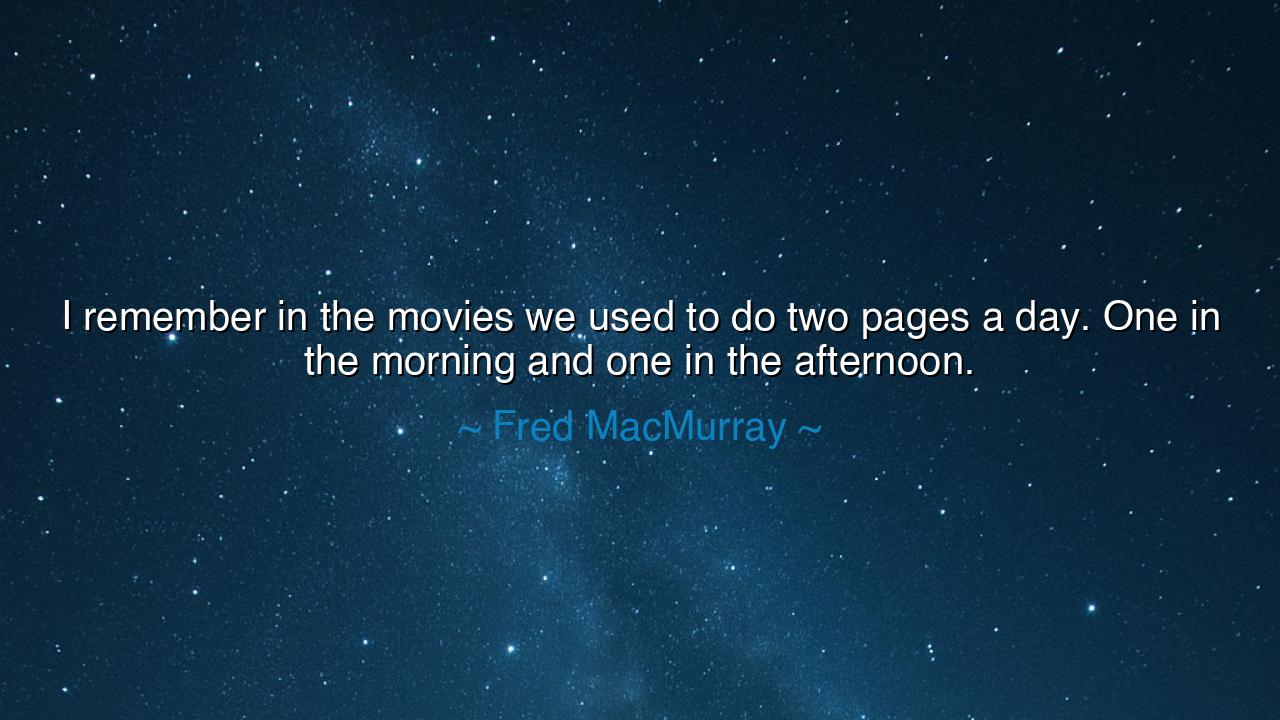
I remember in the movies we used to do two pages a day. One in
I remember in the movies we used to do two pages a day. One in the morning and one in the afternoon.






Fred MacMurray, the steadfast actor of golden-era Hollywood, once reflected with quiet wonder: “I remember in the movies we used to do two pages a day. One in the morning and one in the afternoon.” Though the words may sound simple, they speak of an age when creation was slow, deliberate, and deeply human. Each line of script was not rushed, but savored; each gesture before the camera was crafted with care. The rhythm of art was measured, not by frantic speed, but by patience, as though every page carried the weight of eternity.
The ancients would have understood such a pace. Did not Homer recite his great epics not in hurried bursts, but in the long, steady cadence of memory and song? Did not the sculptors of Greece chip marble day by day, strike by strike, knowing that the perfection of form demanded time? So too in the studios of MacMurray’s youth, the morning and afternoon were given to just a page each — not because of laziness, but because of devotion. To create slowly is to create with reverence.
History reminds us of this truth in the work of Leonardo da Vinci. His brush sometimes lingered on a single painting for years, a hand’s movement waiting for the vision to ripen. The Mona Lisa was not hurried into the world, but carried like a child through long seasons of gestation. MacMurray’s memory of two pages a day echoes the same principle: that art is not a race, but a pilgrimage, where each step matters.
Yet these words also reveal the changing times. In later generations, films would be made faster, productions accelerated, and the pace of work increased until exhaustion became the measure of success. But MacMurray looks back to a time when the artist’s labor matched the rhythms of breath and daylight — one page with the rising sun, one page with its setting glow. There is nostalgia here, but also wisdom: a reminder that haste often strips art of its soul.
There is also a lesson about balance. To work only two pages a day left room for rest, reflection, and renewal. The actor could bring his best to each moment, not drained by the weight of overwork. The ancients called this moderation: the ability to labor well, but not so hard that the spirit falters. MacMurray’s words remind us that great work is not always born of relentless toil, but often of steady, measured effort sustained across time.
What then should we learn? That in our own lives we must not despise slow progress. If you advance but one page each day — in study, in labor, in the pursuit of your dream — it is enough. For page by page, stone by stone, note by note, the great works of humanity have been built. Do not be seduced by the speed of the world, but honor the steady pace that allows depth, presence, and mastery.
So remember, O seekers of wisdom, the words of Fred MacMurray: “Two pages a day. One in the morning and one in the afternoon.” Live your life like this — steady, deliberate, patient. For in such a rhythm lies not only the secret of art, but the secret of a life well-lived: that greatness is not in rushing, but in carrying each small step with care until, at last, the journey is complete.






AAdministratorAdministrator
Welcome, honored guests. Please leave a comment, we will respond soon